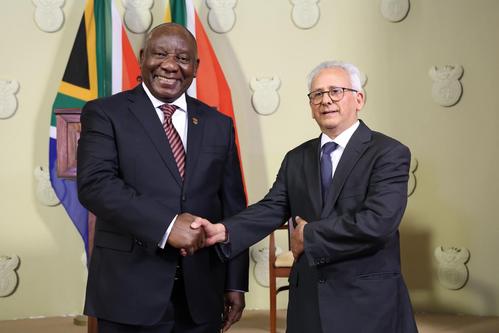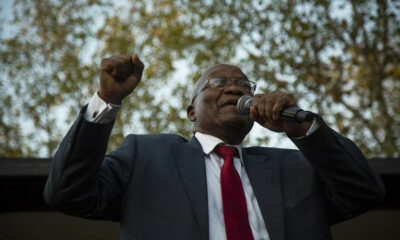News
Firoz Cachalia Takes Helm as South Africa’s New Police Minister: A Fresh Start Amid Turmoil

In a packed ceremony at the iconic Union Buildings this past Friday, Professor Firoz Cachalia was sworn in as South Africa’s new Minister of Police. The event, presided over by President Cyril Ramaphosa and witnessed by National Police Commissioner Fannie Masemola, signals a critical turning point for a ministry rocked by scandal and shaken public confidence.
Stepping Into Stormy Waters
Cachalia’s appointment comes hot on the heels of the dramatic exit of Senzo Mchunu, who was placed on special leave last month amid explosive accusations. KwaZulu-Natal Police Commissioner Lieutenant-General Nhlanhla Mkhwanazi publicly alleged that Mchunu was involved in corruption, political meddling, and troubling links to drug trafficking syndicates. These serious claims sent shockwaves through the country, exposing fissures within the policing system that many South Africans had long feared.
In this charged atmosphere, Cachalia, known for his sharp legal mind and academic rigor, is seen as a beacon of hope. His reputation as a principled thinker and committed public servant contrasts sharply with the recent turbulence, giving many a reason to believe that real change might be on the horizon.
A Ministry in Need of Credibility
The challenges facing Cachalia are immense. Policing in South Africa has long grappled with issues of political interference and corruption, undermining the very foundations of law enforcement. Public trust is fragile, and social media has been abuzz with calls for transparency and reform. Twitter and Facebook are awash with voices urging the new minister to not only clean house but to root out systemic problems that have allowed corruption to fester.
South Africans are tired of headlines linking police officials to criminal networks and political scheming. For many, Cachalia’s appointment offers a chance to reset and rebuild an institution essential to public safety and democracy.
Ramaphosa’s Confidence and the Road Ahead
In brief remarks following the swearing-in, President Ramaphosa expressed clear confidence in Cachalia’s abilities, stressing his role in “upholding the rule of law and leading the fight against corruption within the police ranks.” The presidency also confirmed plans to launch a formal inquiry into the allegations surrounding Mchunu, underlining a commitment to accountability at the highest levels.
Cachalia’s immediate task is twofold: restore credibility to a bruised ministry and enforce accountability across the police leadership. It’s a tall order in a climate where skepticism runs deep, but his legal background and academic insight may equip him to approach reform thoughtfully and strategically.
A Fresh Angle on Leadership
What sets Cachalia apart is his history of engagement beyond politics and law enforcement, he has long been a public intellectual who understands South Africa’s complex social fabric. His appointment hints at a new style of leadership, one that embraces transparency and respects the independence of policing institutions while confronting entrenched corruption head-on.
As South Africans watch closely, this moment could mark the beginning of a critical shift in policing culture, moving from factional politics and impunity to professionalism and public service.
Policing scandals have often reflected broader struggles in South Africa’s democracy, where political patronage can blur the lines between law enforcement and party interests. Rebuilding the police ministry’s integrity is not just about one minister or one inquiry, it’s about reclaiming trust in institutions vital to social cohesion and justice.
If Cachalia succeeds, it could restore hope that South Africa’s fight against crime and corruption can be more than rhetoric, that it can be real and sustained.
{Source: IOL}
Follow Joburg ETC on Facebook, Twitter , TikTok and Instagram
For more News in Johannesburg, visit joburgetc.com


























